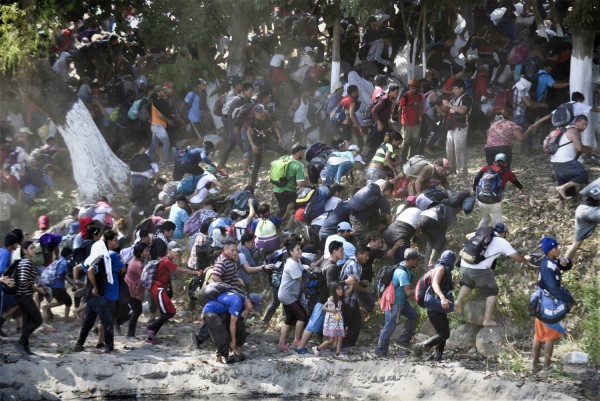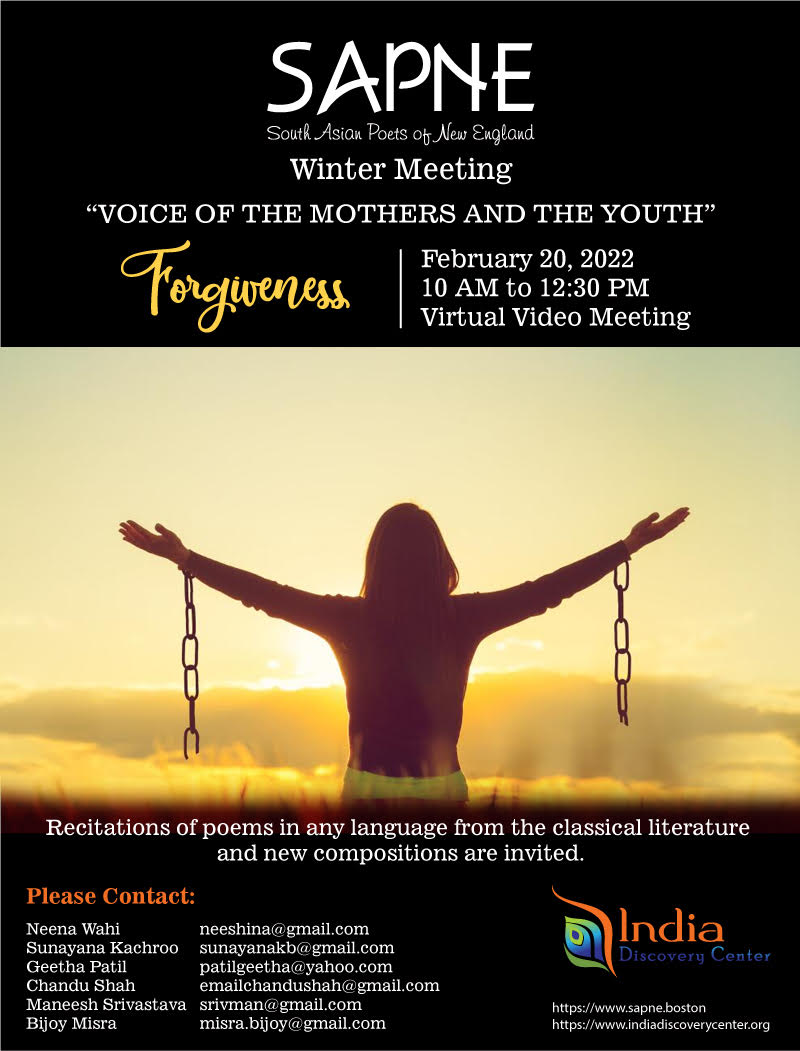Contribute
| Migration – The Story Of Adventure And Separation |
Geetha Patil and Bijoy Misra
02/17/2022
Migration – the story of Adventure and Separation Sergio Inestroza, a Professor in Endicott College, Beverly, Mass and a Mexican poet brought attention to the scenes of human migration happening as a daily event at the US southern border. He recited a poignant poem on the topic at the International Folk Literature Festival organized by SAPNE in September. Mr. Inestroza was invited to lead a session in exploring the humanitarian theme of migration in the current world. The story of massive number of people crossing borders to the neighboring countries is a part of daily news at many locations. The migration is caused through climate variation, food and water scarcity, but mostly for personal security in the new world. SAPNE took up the theme in their Fall meeting held on November 21, 2021, held virtually through internet protocol. Though South Asia has been a destination of world migration in history, it also is lately dispatching people out in search of food and shelter. Twenty-five poets participated in the session exploring humanity, pain, food and spirituality. Bijoy Misra read the bio-sketch of the professor and invited him for his remarks and presentation. As the protocol of SAPNE quarterly assemblies, poets followed with their contributions as each felt appropriate to the flow of poetry. Poems in Spanish, Marathi, Gujarati, Bengali, Punjabi, Kannada, Odia, Hindi and English were recited. Sergio Inestrosa’s Spanish poem, Cristo Migrante spoke about the migrant caravan at the border of United States from Mexico. The poem described how they came from a long distance with a dream for better life and wished to cross the border. Ambuja Salgaonkar presented her Marathi poem परत...of the migrated people who returned to their native places by taking a huge risk during the COVID pandemic. The poem spoke how people leave their native place for education, marriage, employment or business and return in confusion. Manorama Choudhury read her Odia poem titled, ମàଠାଠବିଶàà±à¬¾à¬¸ ଚà‡à¬¨à¬¾à¬ ଆକାଶ ! (A little hope and a piece of sky) that narrated the pathetic situations of the migrants who migrated to foreign countries for a better future. People get desperate to cross the borders legally or illegally when they are denied of basic requirements and respect in their own land. Debilal Mishra recited his English poem, The Jolly that narrated the social, emotional and spiritual dimensions of human life. Migration has become an inevitable part of life and it happens continuously with positive or negative consequences. Bijoy Misra read his Odia poem titled, ମା à¬²à‹ à¬šà¬¾à¬²à¬¿à¬ªà¬¾à¬°àନାହିଠମàହିଠ. The poem narrated the assumed dialog between a mother and a daughter of a real story. The daughter is tired with the long walk, the mother consoles her not to look back! Geetha Patil recited her English Poem titled, The Pains of Migration. Migrations whether voluntary or forced and the processes of settling down permanently or temporarily are always difficult and pathetic. This poem described the emotions of migrants when they relocate to a new place. Preetpal Singh recited his poem, कà¥à¤¶ पाया कà¥à¤¶ गवाया . Migrants face challenges in learning new language, adopting to new foods, creating new friends, and accepting a new way of life. The misery is laced with the new found security in life. Swapna Ray read her Bengali poem, পà§à¦¨à¦°à§à¦œà¦¨à§à¦®.. A young boy migrates to a distant destination leaving behind his loved ones. Life starts afresh and it can appear as a rebirth! Neena Wahi read a Hindi poem पà¥à¤°à¤µà¤¾à¤¸à¤¿à¤¨à¥€ की पीड़ा. Immigration brings nostalgia and loneliness. The new mechanical daily life replaces the sweetness of the native environment. Rahul Ray followed with a Bengali poem, আমরা অà¦à¦¿à¦¬à¦¾à¦¸à§€ , that narrated the positive feelings of the migrants. Unlike the migrating birds or flocks of salmon that go back and forth between warm and cold places, the humans create a new beginning. Amandeep Singh sang his Punjabi poem, ਪà©à¨°à¨¦à©‡à¨¶. The immigration brings new opportunities to make life better. Even though people love their mother country and long for her, it gets hard to go back. Amitav Ganguly recited his English poem The Migrants that highlighted the pains and challenges of seasonal migrant workers. The pandemic situation causes workers suffer a lot being stranded lonely in arbitrary locations. Sunanda Mishra-Panda recited her Odia poem, ପàà¬°à¬¬à¬¾à¬¸à€ à¬¬ààŸà¬¬à¬¸à¬¾àŸà€ . Mrchants traveled to distant countries for businesses and some did settle down occasionally. In modern days, people travel freely and settle down in countries of their choice. Medhavi Malviya followed with a Hindi poem, à¤à¥‚खे लोग वापस आ रहे हैं ‘Hungry people Are Coming Back.’ People migrate to alleviate hunger, the forced retreat in pandemic brings new pain. Let migration for food stop! Kanak Hota read her English poem, Home Sweet Home! The migration can be a positive experience with the blessings of two homes. One can carry the sweet memory of the native land while creating happiness in the new land. Maneesh Srivastava followed up with a Hindi poem मैं घर से निकल आया हूठthat described the lonely feelings of a migrant. A migrant recants the journey for a handful of dreams while recalling his native place, relatives, and friends. Sajed Kamal recited his English poem, ‘The Illegal Immigrant.’ Are the laws fair? People break the laws to migrate from one place to another. It is a social issue of justice in humanity. Chandu Shah followed up with a Gujarati poem, હિજરત. New location can create new sensitivity and returning back can cause confusion. The poet gave an example during the pandemic. The video of the program is produced by Maneesh Srivastava and is posted at https://youtu.be/nK84CTKoMZI The Winter meeting of South Asian Poets of New England (SAPNE) is scheduled for Sunday, February 20, 10 AM (US East Coast Time) via Zoom. The topic is Forgiveness. More information is at https://www.sapne.boston. SAPNE is a wing of India Discovery Center, the educational initiative in Boston, https://www.indiadiscoverycenter.org
Prem Nagar presented his Hindi poem, मैं कà¥à¤¯à¤¾ गà¥à¤¨à¤—à¥à¤¨à¤¾ रहा हूà¤. What is human origin and what is our journey? Do we lose or gain in life? Gouri Datta followed up with a Hindi poem, जिंदगी à¤à¤• पà¥à¤°à¤µà¤¾à¤¸ है. Animals, birds and human beings migrate in search of better weather, foods, and a better life. New opportunities in distant lands can enrich life.
Vasant Machwe presented his Hindi poem, होसे, a ten year old boy who crossed the border of Mexico and entered the American territory with his parents who left him at a road side food shop in a dark night. They said “we will come back soon with food for you.†Now, fourteen the boy longs to hug his mother and play with her! Jayant Dave concluded the event with a Gujarati poem, સà«àª–à«€ કાગડો . Happy is the person who always carries a feeling of happiness in whatever situation he is. Hope, need and desire to escape make people migrate. People can transform into seeing the brighter and ethical side of our journey in the world! Be happy!
You may also access this article through our web-site http://www.lokvani.com/


.jpg)